Analysis of Clinical Teaching and Professional Development Factors
VerifiedAdded on 2023/06/09
|8
|1974
|306
Report
AI Summary
This report provides a critical analysis of the factors that enable nurses to learn in a practice setting. It begins by establishing a conceptual frame of nursing knowledge based on Carper's four sources: empirical, ethical, personal, and aesthetic knowledge, along with contextual knowledge encompassing procedural, material, organizational, and social dimensions. The report then examines individual factors such as curiosity, motivation, job satisfaction, age, experience, and education level, highlighting their impact on competence development. Contextual factors, including the intensive care environment and prevailing culture, are discussed, emphasizing the importance of appropriate timing for training and the nurse's relationship with physicians. Organizational factors, such as shared decision-making, positive leadership, and mentoring support, are also explored. The analysis concludes that practical knowledge is acquired through observation and interaction with expert nurses, while perceptual knowledge stems from direct experiences in care situations, ultimately demonstrating how individual, contextual, and organizational factors collectively influence nurses' learning abilities in practice.
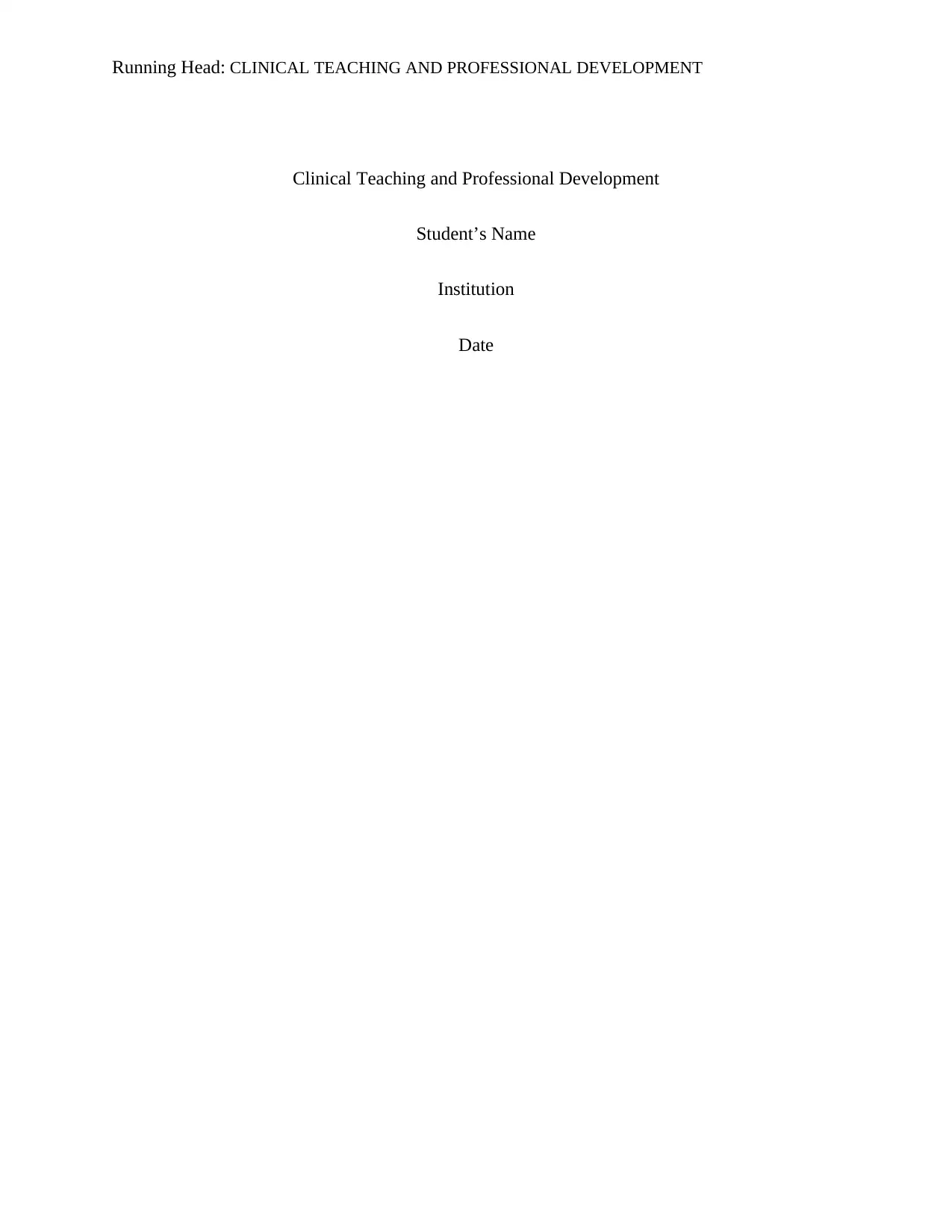
Running Head: CLINICAL TEACHING AND PROFESSIONAL DEVELOPMENT
Clinical Teaching and Professional Development
Student’s Name
Institution
Date
Clinical Teaching and Professional Development
Student’s Name
Institution
Date
Paraphrase This Document
Need a fresh take? Get an instant paraphrase of this document with our AI Paraphraser
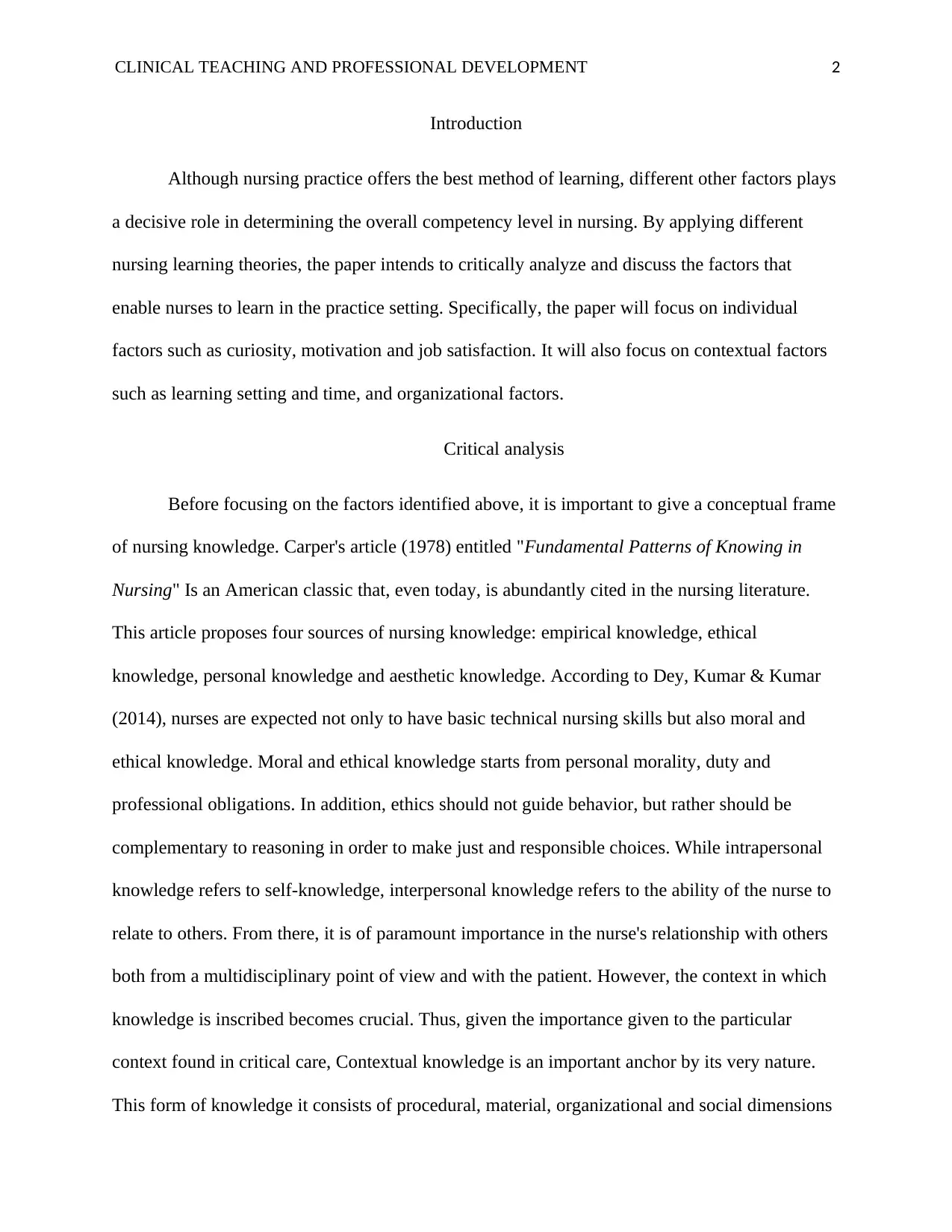
CLINICAL TEACHING AND PROFESSIONAL DEVELOPMENT 2
Introduction
Although nursing practice offers the best method of learning, different other factors plays
a decisive role in determining the overall competency level in nursing. By applying different
nursing learning theories, the paper intends to critically analyze and discuss the factors that
enable nurses to learn in the practice setting. Specifically, the paper will focus on individual
factors such as curiosity, motivation and job satisfaction. It will also focus on contextual factors
such as learning setting and time, and organizational factors.
Critical analysis
Before focusing on the factors identified above, it is important to give a conceptual frame
of nursing knowledge. Carper's article (1978) entitled "Fundamental Patterns of Knowing in
Nursing" Is an American classic that, even today, is abundantly cited in the nursing literature.
This article proposes four sources of nursing knowledge: empirical knowledge, ethical
knowledge, personal knowledge and aesthetic knowledge. According to Dey, Kumar & Kumar
(2014), nurses are expected not only to have basic technical nursing skills but also moral and
ethical knowledge. Moral and ethical knowledge starts from personal morality, duty and
professional obligations. In addition, ethics should not guide behavior, but rather should be
complementary to reasoning in order to make just and responsible choices. While intrapersonal
knowledge refers to self-knowledge, interpersonal knowledge refers to the ability of the nurse to
relate to others. From there, it is of paramount importance in the nurse's relationship with others
both from a multidisciplinary point of view and with the patient. However, the context in which
knowledge is inscribed becomes crucial. Thus, given the importance given to the particular
context found in critical care, Contextual knowledge is an important anchor by its very nature.
This form of knowledge it consists of procedural, material, organizational and social dimensions
Introduction
Although nursing practice offers the best method of learning, different other factors plays
a decisive role in determining the overall competency level in nursing. By applying different
nursing learning theories, the paper intends to critically analyze and discuss the factors that
enable nurses to learn in the practice setting. Specifically, the paper will focus on individual
factors such as curiosity, motivation and job satisfaction. It will also focus on contextual factors
such as learning setting and time, and organizational factors.
Critical analysis
Before focusing on the factors identified above, it is important to give a conceptual frame
of nursing knowledge. Carper's article (1978) entitled "Fundamental Patterns of Knowing in
Nursing" Is an American classic that, even today, is abundantly cited in the nursing literature.
This article proposes four sources of nursing knowledge: empirical knowledge, ethical
knowledge, personal knowledge and aesthetic knowledge. According to Dey, Kumar & Kumar
(2014), nurses are expected not only to have basic technical nursing skills but also moral and
ethical knowledge. Moral and ethical knowledge starts from personal morality, duty and
professional obligations. In addition, ethics should not guide behavior, but rather should be
complementary to reasoning in order to make just and responsible choices. While intrapersonal
knowledge refers to self-knowledge, interpersonal knowledge refers to the ability of the nurse to
relate to others. From there, it is of paramount importance in the nurse's relationship with others
both from a multidisciplinary point of view and with the patient. However, the context in which
knowledge is inscribed becomes crucial. Thus, given the importance given to the particular
context found in critical care, Contextual knowledge is an important anchor by its very nature.
This form of knowledge it consists of procedural, material, organizational and social dimensions
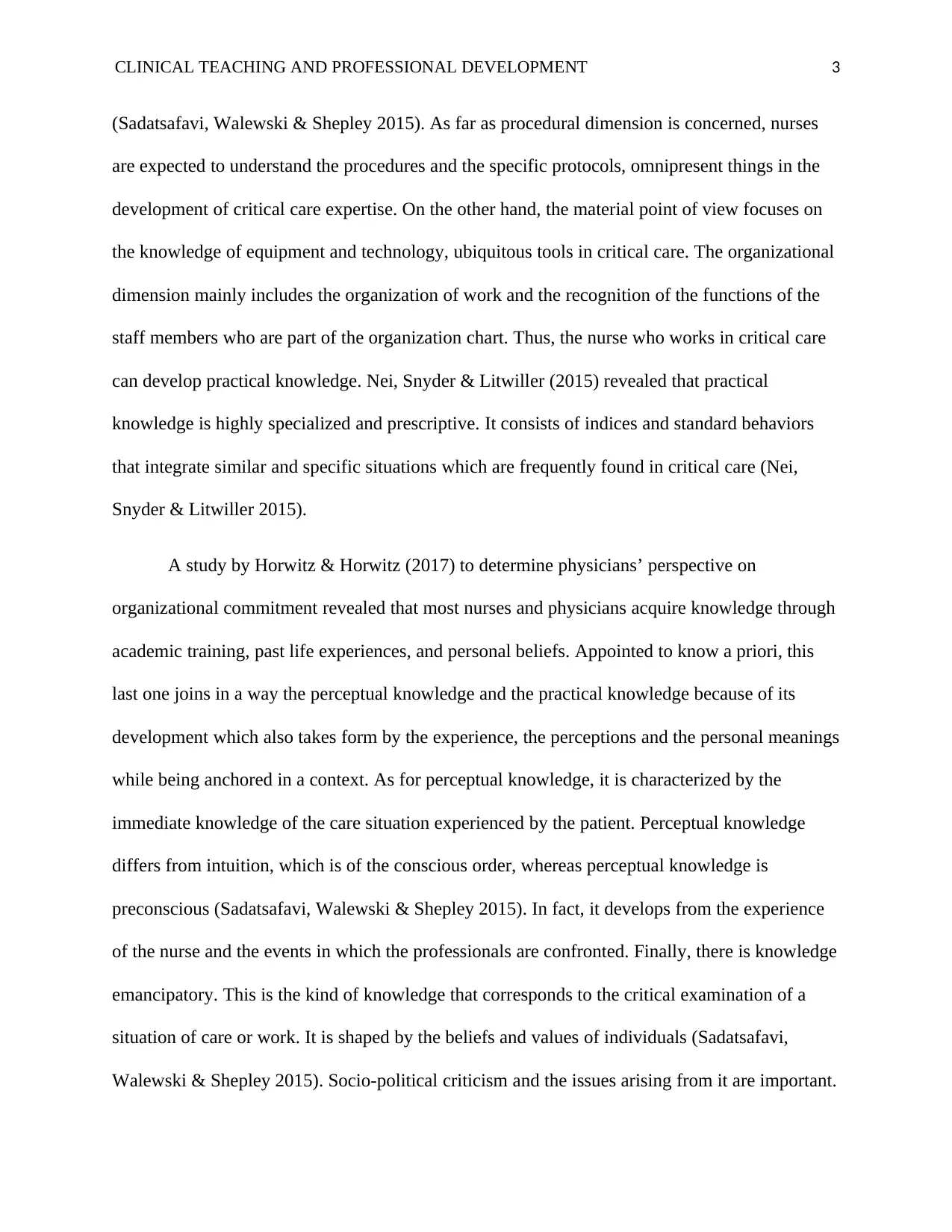
CLINICAL TEACHING AND PROFESSIONAL DEVELOPMENT 3
(Sadatsafavi, Walewski & Shepley 2015). As far as procedural dimension is concerned, nurses
are expected to understand the procedures and the specific protocols, omnipresent things in the
development of critical care expertise. On the other hand, the material point of view focuses on
the knowledge of equipment and technology, ubiquitous tools in critical care. The organizational
dimension mainly includes the organization of work and the recognition of the functions of the
staff members who are part of the organization chart. Thus, the nurse who works in critical care
can develop practical knowledge. Nei, Snyder & Litwiller (2015) revealed that practical
knowledge is highly specialized and prescriptive. It consists of indices and standard behaviors
that integrate similar and specific situations which are frequently found in critical care (Nei,
Snyder & Litwiller 2015).
A study by Horwitz & Horwitz (2017) to determine physicians’ perspective on
organizational commitment revealed that most nurses and physicians acquire knowledge through
academic training, past life experiences, and personal beliefs. Appointed to know a priori, this
last one joins in a way the perceptual knowledge and the practical knowledge because of its
development which also takes form by the experience, the perceptions and the personal meanings
while being anchored in a context. As for perceptual knowledge, it is characterized by the
immediate knowledge of the care situation experienced by the patient. Perceptual knowledge
differs from intuition, which is of the conscious order, whereas perceptual knowledge is
preconscious (Sadatsafavi, Walewski & Shepley 2015). In fact, it develops from the experience
of the nurse and the events in which the professionals are confronted. Finally, there is knowledge
emancipatory. This is the kind of knowledge that corresponds to the critical examination of a
situation of care or work. It is shaped by the beliefs and values of individuals (Sadatsafavi,
Walewski & Shepley 2015). Socio-political criticism and the issues arising from it are important.
(Sadatsafavi, Walewski & Shepley 2015). As far as procedural dimension is concerned, nurses
are expected to understand the procedures and the specific protocols, omnipresent things in the
development of critical care expertise. On the other hand, the material point of view focuses on
the knowledge of equipment and technology, ubiquitous tools in critical care. The organizational
dimension mainly includes the organization of work and the recognition of the functions of the
staff members who are part of the organization chart. Thus, the nurse who works in critical care
can develop practical knowledge. Nei, Snyder & Litwiller (2015) revealed that practical
knowledge is highly specialized and prescriptive. It consists of indices and standard behaviors
that integrate similar and specific situations which are frequently found in critical care (Nei,
Snyder & Litwiller 2015).
A study by Horwitz & Horwitz (2017) to determine physicians’ perspective on
organizational commitment revealed that most nurses and physicians acquire knowledge through
academic training, past life experiences, and personal beliefs. Appointed to know a priori, this
last one joins in a way the perceptual knowledge and the practical knowledge because of its
development which also takes form by the experience, the perceptions and the personal meanings
while being anchored in a context. As for perceptual knowledge, it is characterized by the
immediate knowledge of the care situation experienced by the patient. Perceptual knowledge
differs from intuition, which is of the conscious order, whereas perceptual knowledge is
preconscious (Sadatsafavi, Walewski & Shepley 2015). In fact, it develops from the experience
of the nurse and the events in which the professionals are confronted. Finally, there is knowledge
emancipatory. This is the kind of knowledge that corresponds to the critical examination of a
situation of care or work. It is shaped by the beliefs and values of individuals (Sadatsafavi,
Walewski & Shepley 2015). Socio-political criticism and the issues arising from it are important.
⊘ This is a preview!⊘
Do you want full access?
Subscribe today to unlock all pages.

Trusted by 1+ million students worldwide
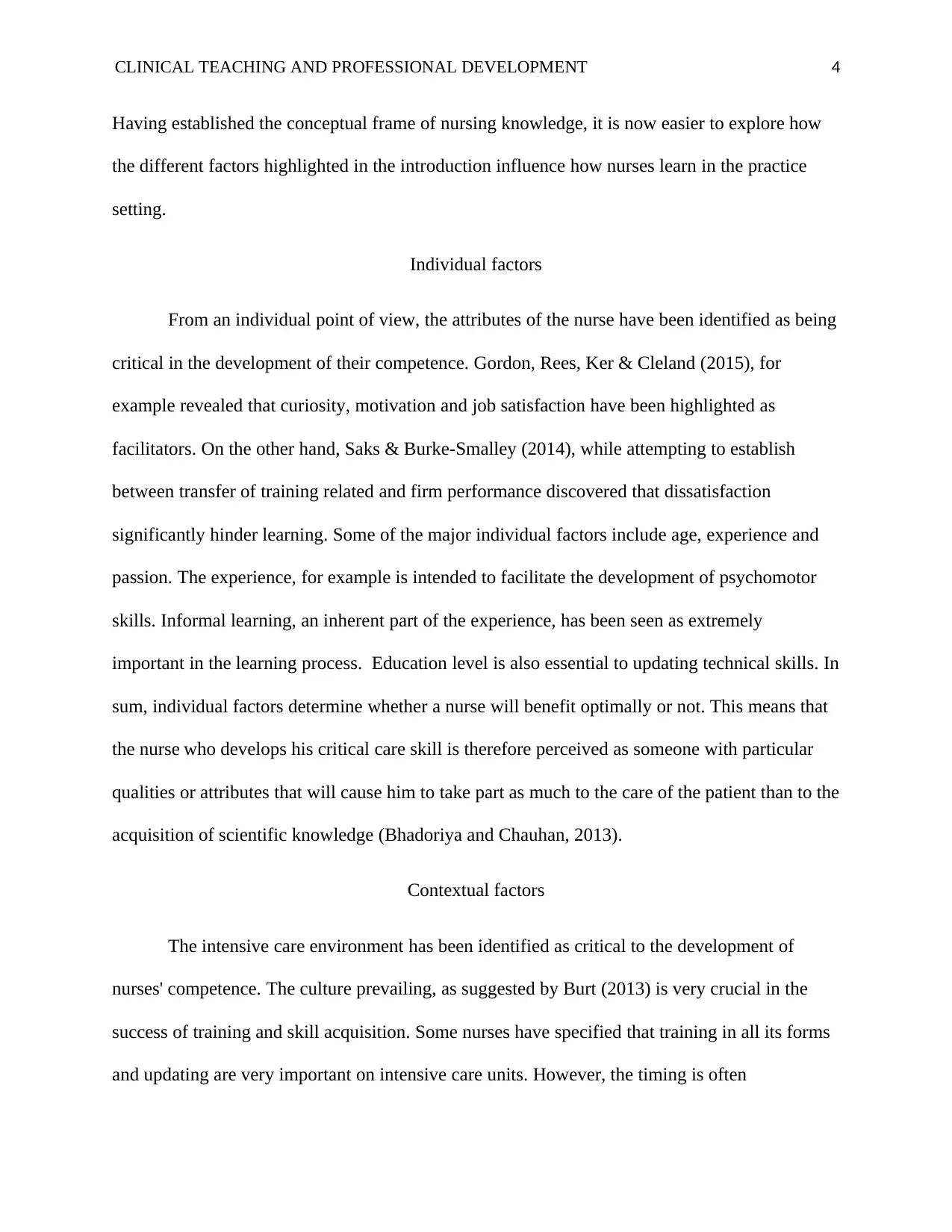
CLINICAL TEACHING AND PROFESSIONAL DEVELOPMENT 4
Having established the conceptual frame of nursing knowledge, it is now easier to explore how
the different factors highlighted in the introduction influence how nurses learn in the practice
setting.
Individual factors
From an individual point of view, the attributes of the nurse have been identified as being
critical in the development of their competence. Gordon, Rees, Ker & Cleland (2015), for
example revealed that curiosity, motivation and job satisfaction have been highlighted as
facilitators. On the other hand, Saks & Burke-Smalley (2014), while attempting to establish
between transfer of training related and firm performance discovered that dissatisfaction
significantly hinder learning. Some of the major individual factors include age, experience and
passion. The experience, for example is intended to facilitate the development of psychomotor
skills. Informal learning, an inherent part of the experience, has been seen as extremely
important in the learning process. Education level is also essential to updating technical skills. In
sum, individual factors determine whether a nurse will benefit optimally or not. This means that
the nurse who develops his critical care skill is therefore perceived as someone with particular
qualities or attributes that will cause him to take part as much to the care of the patient than to the
acquisition of scientific knowledge (Bhadoriya and Chauhan, 2013).
Contextual factors
The intensive care environment has been identified as critical to the development of
nurses' competence. The culture prevailing, as suggested by Burt (2013) is very crucial in the
success of training and skill acquisition. Some nurses have specified that training in all its forms
and updating are very important on intensive care units. However, the timing is often
Having established the conceptual frame of nursing knowledge, it is now easier to explore how
the different factors highlighted in the introduction influence how nurses learn in the practice
setting.
Individual factors
From an individual point of view, the attributes of the nurse have been identified as being
critical in the development of their competence. Gordon, Rees, Ker & Cleland (2015), for
example revealed that curiosity, motivation and job satisfaction have been highlighted as
facilitators. On the other hand, Saks & Burke-Smalley (2014), while attempting to establish
between transfer of training related and firm performance discovered that dissatisfaction
significantly hinder learning. Some of the major individual factors include age, experience and
passion. The experience, for example is intended to facilitate the development of psychomotor
skills. Informal learning, an inherent part of the experience, has been seen as extremely
important in the learning process. Education level is also essential to updating technical skills. In
sum, individual factors determine whether a nurse will benefit optimally or not. This means that
the nurse who develops his critical care skill is therefore perceived as someone with particular
qualities or attributes that will cause him to take part as much to the care of the patient than to the
acquisition of scientific knowledge (Bhadoriya and Chauhan, 2013).
Contextual factors
The intensive care environment has been identified as critical to the development of
nurses' competence. The culture prevailing, as suggested by Burt (2013) is very crucial in the
success of training and skill acquisition. Some nurses have specified that training in all its forms
and updating are very important on intensive care units. However, the timing is often
Paraphrase This Document
Need a fresh take? Get an instant paraphrase of this document with our AI Paraphraser
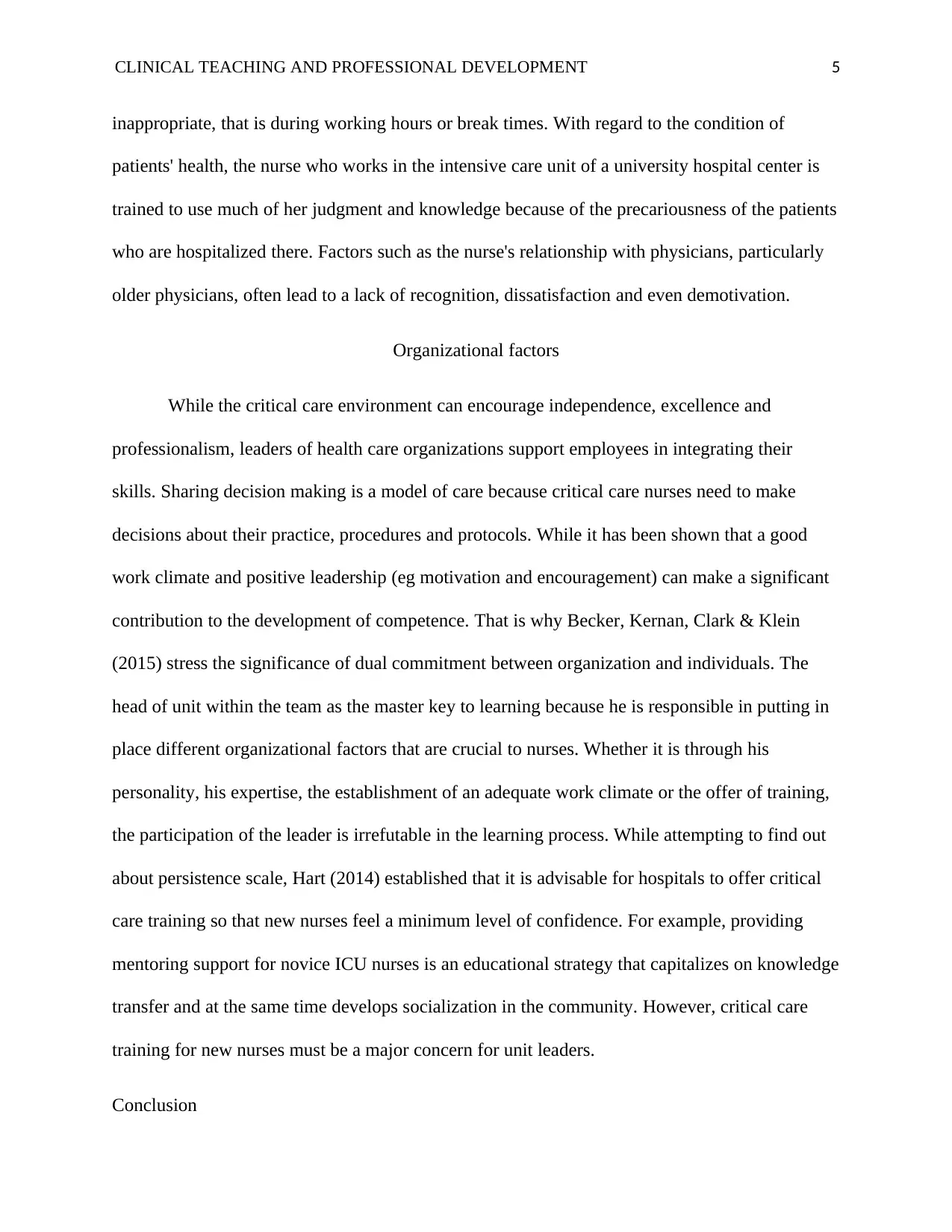
CLINICAL TEACHING AND PROFESSIONAL DEVELOPMENT 5
inappropriate, that is during working hours or break times. With regard to the condition of
patients' health, the nurse who works in the intensive care unit of a university hospital center is
trained to use much of her judgment and knowledge because of the precariousness of the patients
who are hospitalized there. Factors such as the nurse's relationship with physicians, particularly
older physicians, often lead to a lack of recognition, dissatisfaction and even demotivation.
Organizational factors
While the critical care environment can encourage independence, excellence and
professionalism, leaders of health care organizations support employees in integrating their
skills. Sharing decision making is a model of care because critical care nurses need to make
decisions about their practice, procedures and protocols. While it has been shown that a good
work climate and positive leadership (eg motivation and encouragement) can make a significant
contribution to the development of competence. That is why Becker, Kernan, Clark & Klein
(2015) stress the significance of dual commitment between organization and individuals. The
head of unit within the team as the master key to learning because he is responsible in putting in
place different organizational factors that are crucial to nurses. Whether it is through his
personality, his expertise, the establishment of an adequate work climate or the offer of training,
the participation of the leader is irrefutable in the learning process. While attempting to find out
about persistence scale, Hart (2014) established that it is advisable for hospitals to offer critical
care training so that new nurses feel a minimum level of confidence. For example, providing
mentoring support for novice ICU nurses is an educational strategy that capitalizes on knowledge
transfer and at the same time develops socialization in the community. However, critical care
training for new nurses must be a major concern for unit leaders.
Conclusion
inappropriate, that is during working hours or break times. With regard to the condition of
patients' health, the nurse who works in the intensive care unit of a university hospital center is
trained to use much of her judgment and knowledge because of the precariousness of the patients
who are hospitalized there. Factors such as the nurse's relationship with physicians, particularly
older physicians, often lead to a lack of recognition, dissatisfaction and even demotivation.
Organizational factors
While the critical care environment can encourage independence, excellence and
professionalism, leaders of health care organizations support employees in integrating their
skills. Sharing decision making is a model of care because critical care nurses need to make
decisions about their practice, procedures and protocols. While it has been shown that a good
work climate and positive leadership (eg motivation and encouragement) can make a significant
contribution to the development of competence. That is why Becker, Kernan, Clark & Klein
(2015) stress the significance of dual commitment between organization and individuals. The
head of unit within the team as the master key to learning because he is responsible in putting in
place different organizational factors that are crucial to nurses. Whether it is through his
personality, his expertise, the establishment of an adequate work climate or the offer of training,
the participation of the leader is irrefutable in the learning process. While attempting to find out
about persistence scale, Hart (2014) established that it is advisable for hospitals to offer critical
care training so that new nurses feel a minimum level of confidence. For example, providing
mentoring support for novice ICU nurses is an educational strategy that capitalizes on knowledge
transfer and at the same time develops socialization in the community. However, critical care
training for new nurses must be a major concern for unit leaders.
Conclusion
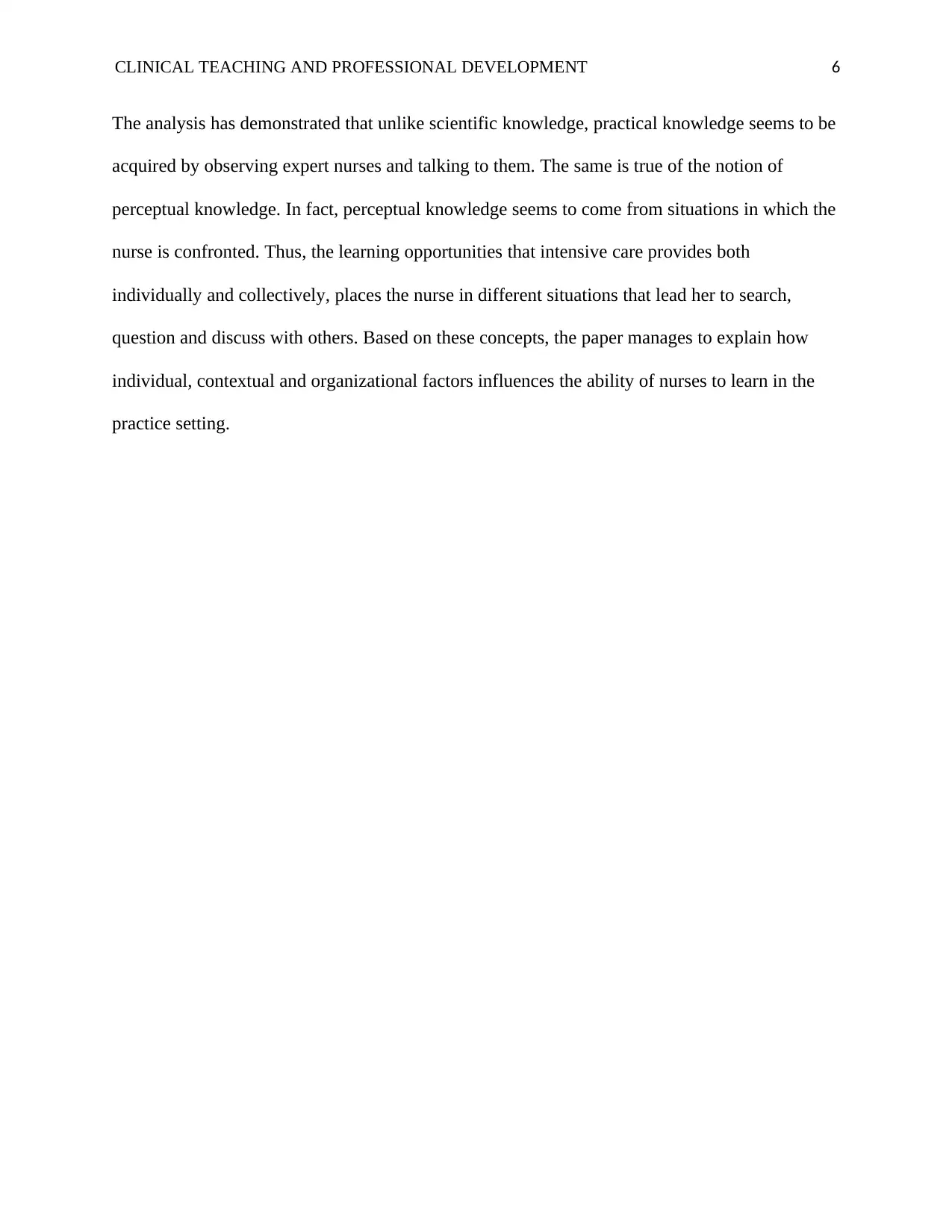
CLINICAL TEACHING AND PROFESSIONAL DEVELOPMENT 6
The analysis has demonstrated that unlike scientific knowledge, practical knowledge seems to be
acquired by observing expert nurses and talking to them. The same is true of the notion of
perceptual knowledge. In fact, perceptual knowledge seems to come from situations in which the
nurse is confronted. Thus, the learning opportunities that intensive care provides both
individually and collectively, places the nurse in different situations that lead her to search,
question and discuss with others. Based on these concepts, the paper manages to explain how
individual, contextual and organizational factors influences the ability of nurses to learn in the
practice setting.
The analysis has demonstrated that unlike scientific knowledge, practical knowledge seems to be
acquired by observing expert nurses and talking to them. The same is true of the notion of
perceptual knowledge. In fact, perceptual knowledge seems to come from situations in which the
nurse is confronted. Thus, the learning opportunities that intensive care provides both
individually and collectively, places the nurse in different situations that lead her to search,
question and discuss with others. Based on these concepts, the paper manages to explain how
individual, contextual and organizational factors influences the ability of nurses to learn in the
practice setting.
⊘ This is a preview!⊘
Do you want full access?
Subscribe today to unlock all pages.

Trusted by 1+ million students worldwide
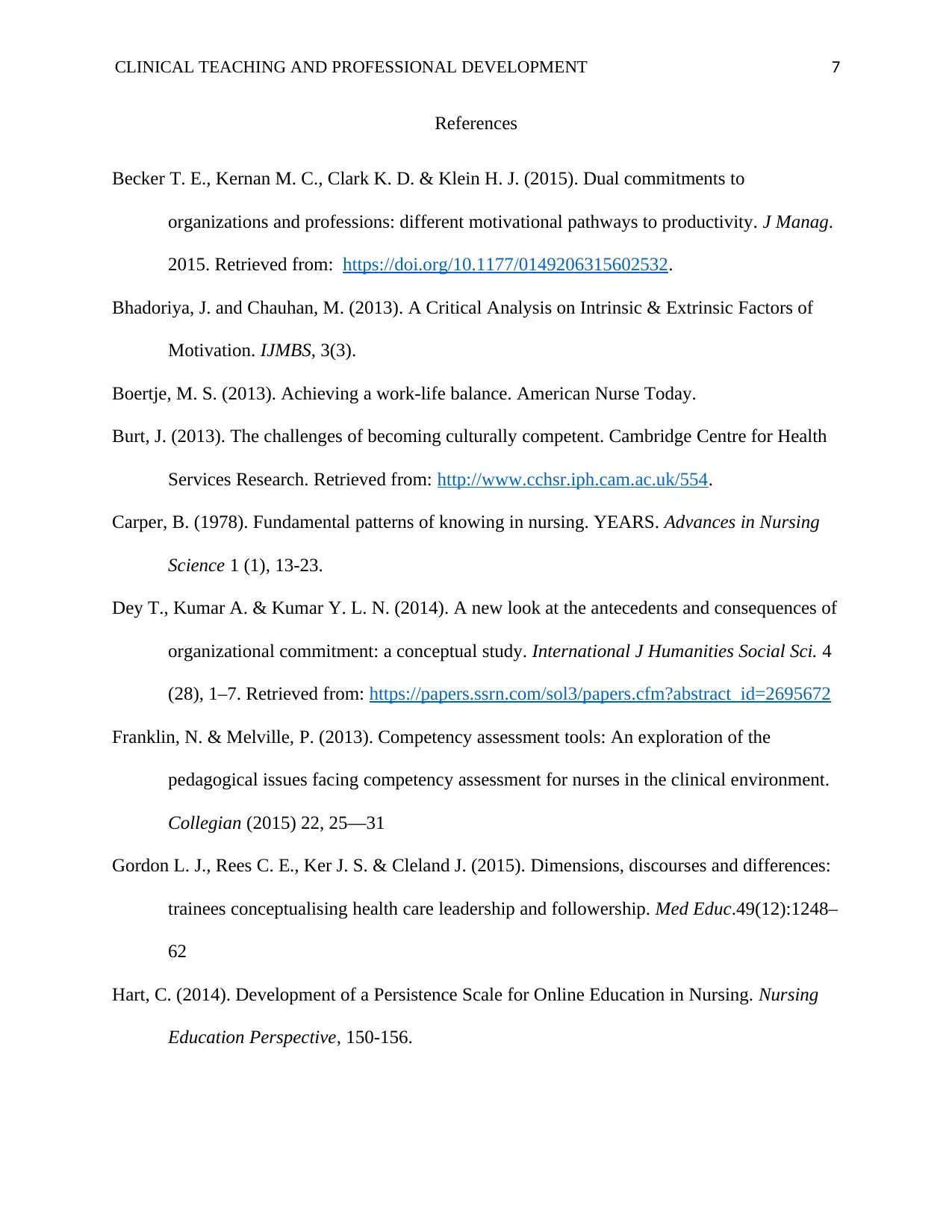
CLINICAL TEACHING AND PROFESSIONAL DEVELOPMENT 7
References
Becker T. E., Kernan M. C., Clark K. D. & Klein H. J. (2015). Dual commitments to
organizations and professions: different motivational pathways to productivity. J Manag.
2015. Retrieved from: https://doi.org/10.1177/0149206315602532.
Bhadoriya, J. and Chauhan, M. (2013). A Critical Analysis on Intrinsic & Extrinsic Factors of
Motivation. IJMBS, 3(3).
Boertje, M. S. (2013). Achieving a work-life balance. American Nurse Today.
Burt, J. (2013). The challenges of becoming culturally competent. Cambridge Centre for Health
Services Research. Retrieved from: http://www.cchsr.iph.cam.ac.uk/554.
Carper, B. (1978). Fundamental patterns of knowing in nursing. YEARS. Advances in Nursing
Science 1 (1), 13-23.
Dey T., Kumar A. & Kumar Y. L. N. (2014). A new look at the antecedents and consequences of
organizational commitment: a conceptual study. International J Humanities Social Sci. 4
(28), 1–7. Retrieved from: https://papers.ssrn.com/sol3/papers.cfm?abstract_id=2695672
Franklin, N. & Melville, P. (2013). Competency assessment tools: An exploration of the
pedagogical issues facing competency assessment for nurses in the clinical environment.
Collegian (2015) 22, 25—31
Gordon L. J., Rees C. E., Ker J. S. & Cleland J. (2015). Dimensions, discourses and differences:
trainees conceptualising health care leadership and followership. Med Educ.49(12):1248–
62
Hart, C. (2014). Development of a Persistence Scale for Online Education in Nursing. Nursing
Education Perspective, 150-156.
References
Becker T. E., Kernan M. C., Clark K. D. & Klein H. J. (2015). Dual commitments to
organizations and professions: different motivational pathways to productivity. J Manag.
2015. Retrieved from: https://doi.org/10.1177/0149206315602532.
Bhadoriya, J. and Chauhan, M. (2013). A Critical Analysis on Intrinsic & Extrinsic Factors of
Motivation. IJMBS, 3(3).
Boertje, M. S. (2013). Achieving a work-life balance. American Nurse Today.
Burt, J. (2013). The challenges of becoming culturally competent. Cambridge Centre for Health
Services Research. Retrieved from: http://www.cchsr.iph.cam.ac.uk/554.
Carper, B. (1978). Fundamental patterns of knowing in nursing. YEARS. Advances in Nursing
Science 1 (1), 13-23.
Dey T., Kumar A. & Kumar Y. L. N. (2014). A new look at the antecedents and consequences of
organizational commitment: a conceptual study. International J Humanities Social Sci. 4
(28), 1–7. Retrieved from: https://papers.ssrn.com/sol3/papers.cfm?abstract_id=2695672
Franklin, N. & Melville, P. (2013). Competency assessment tools: An exploration of the
pedagogical issues facing competency assessment for nurses in the clinical environment.
Collegian (2015) 22, 25—31
Gordon L. J., Rees C. E., Ker J. S. & Cleland J. (2015). Dimensions, discourses and differences:
trainees conceptualising health care leadership and followership. Med Educ.49(12):1248–
62
Hart, C. (2014). Development of a Persistence Scale for Online Education in Nursing. Nursing
Education Perspective, 150-156.
Paraphrase This Document
Need a fresh take? Get an instant paraphrase of this document with our AI Paraphraser
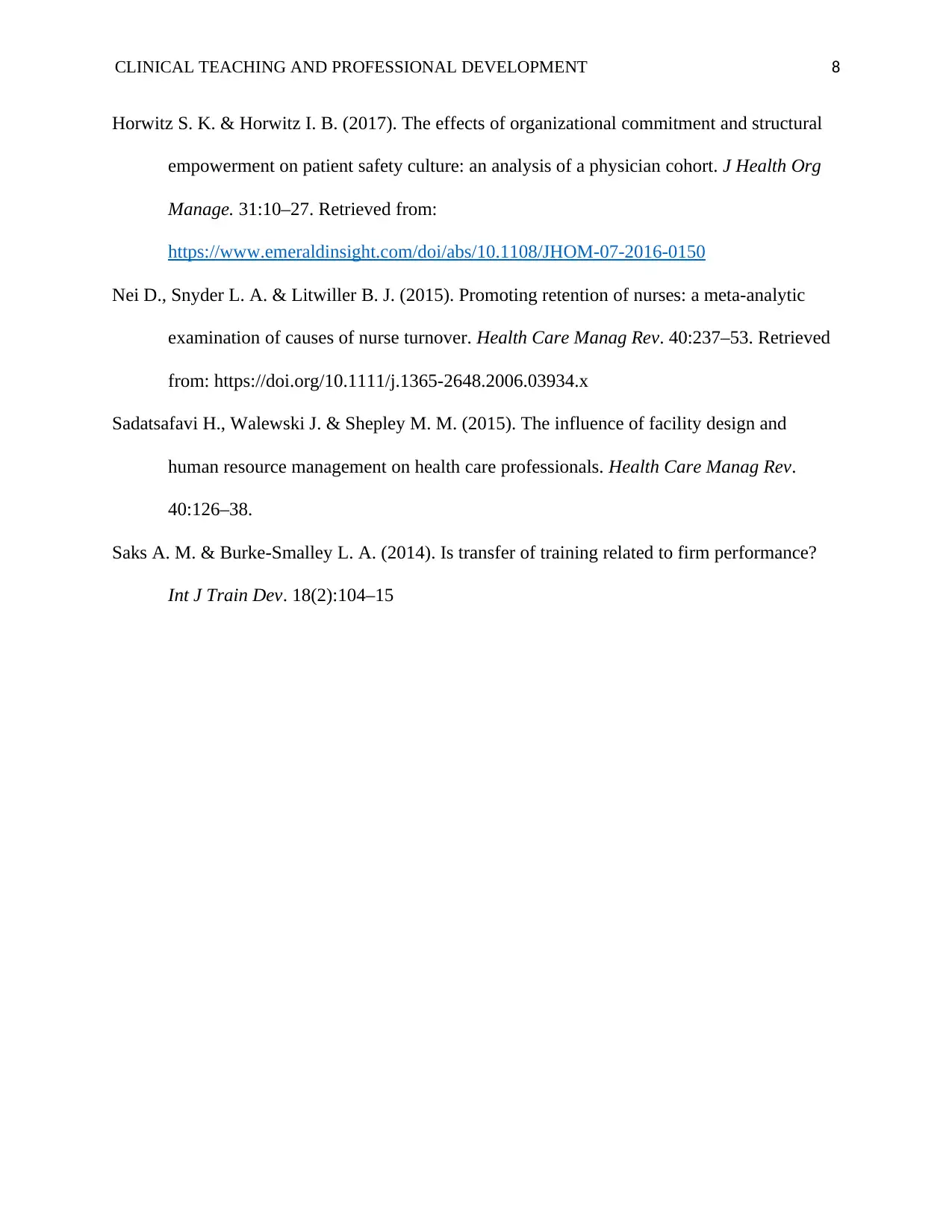
CLINICAL TEACHING AND PROFESSIONAL DEVELOPMENT 8
Horwitz S. K. & Horwitz I. B. (2017). The effects of organizational commitment and structural
empowerment on patient safety culture: an analysis of a physician cohort. J Health Org
Manage. 31:10–27. Retrieved from:
https://www.emeraldinsight.com/doi/abs/10.1108/JHOM-07-2016-0150
Nei D., Snyder L. A. & Litwiller B. J. (2015). Promoting retention of nurses: a meta-analytic
examination of causes of nurse turnover. Health Care Manag Rev. 40:237–53. Retrieved
from: https://doi.org/10.1111/j.1365-2648.2006.03934.x
Sadatsafavi H., Walewski J. & Shepley M. M. (2015). The influence of facility design and
human resource management on health care professionals. Health Care Manag Rev.
40:126–38.
Saks A. M. & Burke-Smalley L. A. (2014). Is transfer of training related to firm performance?
Int J Train Dev. 18(2):104–15
Horwitz S. K. & Horwitz I. B. (2017). The effects of organizational commitment and structural
empowerment on patient safety culture: an analysis of a physician cohort. J Health Org
Manage. 31:10–27. Retrieved from:
https://www.emeraldinsight.com/doi/abs/10.1108/JHOM-07-2016-0150
Nei D., Snyder L. A. & Litwiller B. J. (2015). Promoting retention of nurses: a meta-analytic
examination of causes of nurse turnover. Health Care Manag Rev. 40:237–53. Retrieved
from: https://doi.org/10.1111/j.1365-2648.2006.03934.x
Sadatsafavi H., Walewski J. & Shepley M. M. (2015). The influence of facility design and
human resource management on health care professionals. Health Care Manag Rev.
40:126–38.
Saks A. M. & Burke-Smalley L. A. (2014). Is transfer of training related to firm performance?
Int J Train Dev. 18(2):104–15
1 out of 8
Related Documents
Your All-in-One AI-Powered Toolkit for Academic Success.
+13062052269
info@desklib.com
Available 24*7 on WhatsApp / Email
![[object Object]](/_next/static/media/star-bottom.7253800d.svg)
Unlock your academic potential
Copyright © 2020–2026 A2Z Services. All Rights Reserved. Developed and managed by ZUCOL.





